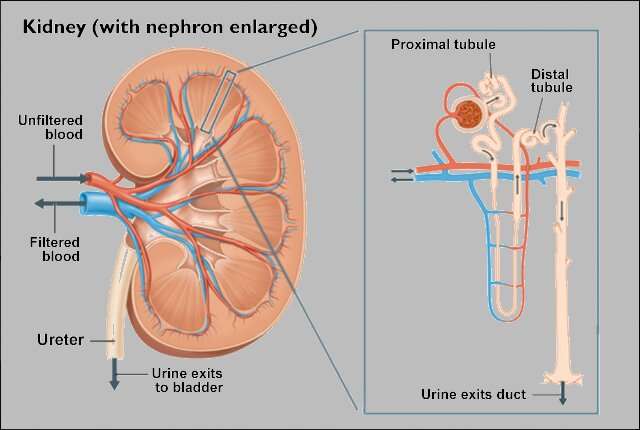SARS-CoV-2 can infect kidneys directly, researchers find

Up to 25 percent of patients’ COVID-19 cases involve acute kidney injury—the kidneys’ equivalent of a heart attack. Clinicians have suspected that such injuries are a side effect of the immune system’s sudden release of inflammatory proteins, cytokines, to battle the SARS-CoV-2 virus. The “cytokine storms” are known to damage tissues and organs.
New research, however, demonstrates that SARS-CoV-2 can directly invade human kidney cells—specifically the proximal tubules, which are major gatekeepers in the organs’ waste-filtering function.
“We introduced this virus onto organoids, which are surrogates that have 11 cell types found in kidneys. Out of all the cell types, only one got infected. If you don’t have these proximal tubule cells or they’re not functional, then your kidney cannot work,” said Benjamin “Beno” Freedman, an associate professor of nephrology at the University of Washington School of Medicine.
Freedman was senior author of the paper published in JCI Insight. The lead author was Louisa Helms. The team employed SARS-CoV-2 variants that had been lab-modified with a novel fluorescent gene, enabling them to easily identify which kidney structures became infected.
Freedman said the team’s finding means clinicians should consider COVID-19-implicated kidney infections “in the same way we think about lung and heart infections—which is to monitor these organs for poorer function going forward. There is a risk of a “long-hauler” effect that could progress to chronic kidney disease, so these patients should consider getting lab tests three to 12 months after they’ve recovered to confirm their kidneys are functioning and stable, in accordance with their physician’s recommendations.”
Unfortunately, clinicians have no diagnostic to know whether certain COVID-19 patients are more vulnerable to kidney infection—though a pre-existing kidney condition would be a logical risk factor. As well, no medications are known to heal a kidney injured by COVID-19. Many patients in these circumstances wind up on dialysis for a short term to provide temporary kidney function until the organs start to recover from the immediate infection.
Source: Read Full Article
